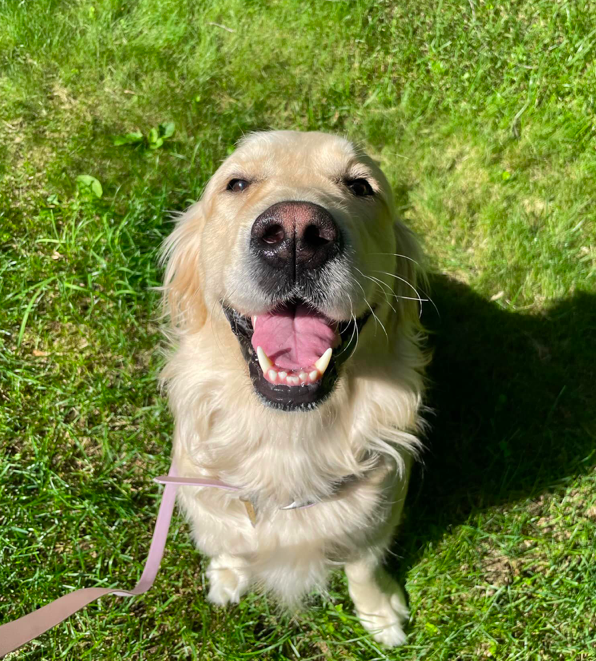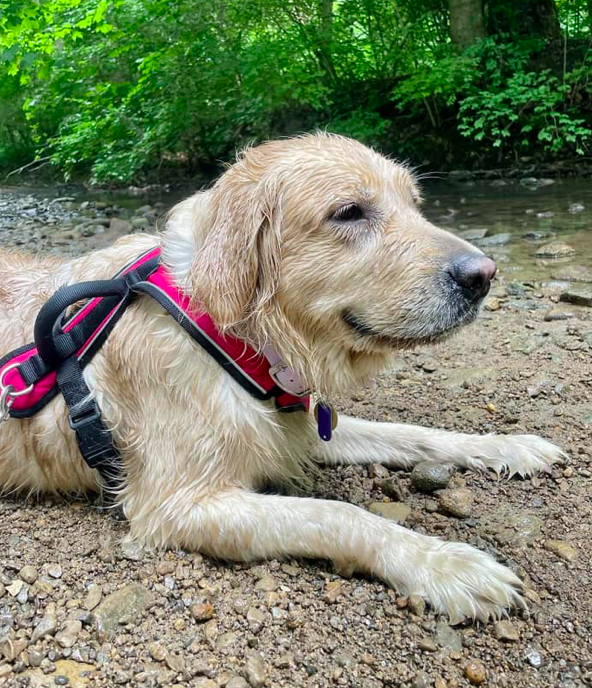From Overwhelmed to Empowered: How One Guardian Learned to Communicate with Their Dog
The Emotional Toll of Miscommunication
There was once a dog who seemed impossible to reach. Walks were a constant battle filled with pulling, barking, and reacting to every little thing. Playdates were out of the question. Around other dogs, there were growls and tense standoffs, making everyone uneasy. Every attempt at training felt like a dead end. Frustration and exhaustion became the norm. The harder their guardian tried to enforce obedience, the more distant the dog became.
Eventually, the dog stopped engaging with the guardian outside of the home. Even their favorite treats could not get their attention. This was not simply bad behavior. It was a complete breakdown in communication.
The turning point did not come from harsher corrections or stricter rules. It came from something unexpected, learning to listen. By shifting from control to understanding, this guardian discovered that the key to change was not about forcing obedience but fostering trust and teamwork.
This is the story of how one dog and their person transformed frustration into connection, proving that real communication is the foundation of a strong and secure bond.
The Struggle: Feeling Overwhelmed and Misunderstood
Meet Drizzle. She arrived at her new home at a year and a half old after being shuffled through multiple homes and foster placements. Her new guardian’s biggest concern was how she would adjust to living with other dogs. Some fosters had nothing but positive things to say. One said they never had any issues with her. Another said she was the go to dog for helping reactive dogs. But one had a very different experience, warning that Drizzle had tried to start a fight and might not be suited for a multi-dog home.
Piecing together her history was complicated, but one thing became clear. Drizzle had learned to mistrust her surroundings over time. While the details of how this happened are a story for another day, today’s focus is how her guardian went from feeling hopeless to building a relationship founded on trust and communication, one that transformed both of their lives.
At first, everything felt like a struggle. Walks were chaotic. Drizzle pulled so hard that her guardian nearly fell over. She constantly searched for ways to escape, even finding a weak spot in the fence and slipping through. One time, she bolted while her guardian was taking a photo, leash and all. Another, she ran half a mile down a creek with her guardian running after her.
Minutes after Drizzle was caught when she took off down the creek
At home, things were not much better. Drizzle would growl and bark at the other dogs, making everyone uneasy. She jumped on counters, stole food, and took off running whenever she got ahold of something she was not supposed to have. She barked for attention, sometimes for what felt like hours.
Her guardian was exhausted. They had tried everything, from verbal corrections and leash pops to focusing on obedience, but nothing seemed to work. Every interaction felt like a battle of wills, and the more they tried to control the behavior, the worse it became.
One night after another frustrating evening, the guardian sat in bed while the weight of the struggle settled in. They had done everything they were taught to do, yet nothing was changing. They felt like they were failing their dog.
The Breakthrough: Shifting to Communication Over Control
The real turning point was not a new training method or a stricter routine. It was a shift in mindset. Instead of asking, "How do I control Drizzle?" the guardian started asking, "How do I help Drizzle feel safe?"
With this new perspective, they began observing her more closely. They noticed how her ears flicked back before reacting, how she stiffened before barking, and how she got overly excited around certain things on walks. Instead of focusing on correcting her, they started focusing on how she felt during those moments. They realized that at times Drizzle was uncertain and stressed. Other times she didn’t know how to communicate what she needed/wanted.
They broke down her behavior piece by piece. Instead of asking her to play with another dog, they gave her space so she would not feel pressured. If she stole food, they provided her with a mental activity so she would not feel bored. If she pulled on walks, they slowed down and let her explore, meeting her instinctual needs instead of fighting against them.
Most importantly, they allowed her to make choices. If she looked at another dog without reacting, they marked and rewarded the behavior. If she chose to disengage instead of barking, she was praised. Slowly, the dynamic shifted. Drizzle started looking to her guardian for guidance instead of bracing for a battle on her own.
Implementing Change: Practical Steps That Made the Difference
The transformation did not happen overnight, but a few key strategies helped rebuild their relationship:
Observation Before Action: Instead of immediately correcting behaviors, the guardian spent time watching Drizzle’s body language, learning the subtle signals that preceded her reactions.
Reinforcing Check-Ins: Whenever Drizzle voluntarily looked back at her guardian instead of fixating on a distraction, she was rewarded. Over time, this became her default response in stressful situations.
Scent Work and Decompression Walks: Instead of exhausting Drizzle with obedience drills, they allowed her to sniff and explore at her own pace, which helped lower her overall stress levels.
Comforting Talk: Instead of staying silent when she felt stressed, the guardian reassured her with a calm and comforting voice to let her know she was not alone.
Meeting Instinctual Needs: They took time to understand natural dog behaviors and provided appropriate outlets, which helped reduce counter-surfing and other frustrating habits.
None of these changes were about forcing obedience. They were about helping Drizzle feel safe enough to engage and learn.
The Transformation: A Confident Guardian and a Trusting Dog
Progress was gradual, but undeniable.
Drizzle started checking in on walks, looking up at her guardian instead of reacting. Encounters with other dogs were no longer a guaranteed disaster. Sometimes, she even chose to ignore them entirely. Other times, she interacted knowing her guardian was there to step in if she needed help. At home, the demand barking decreased, the counter surfing happened less frequently, and her overall stress levels seemed to drop.
The real moment of change happened on a walk near two of Drizzle’s biggest triggers, water and other dogs. Water excited her to the point of frenzy, and other dogs made her anxious. In the past, she would have lunged, pulled, and barked. But on this day, she stayed with her guardian and checked in. Even as other dogs barked at her, she looked at them, then turned to her guardian and waited. A treat was offered. They moved on. At the end of the trip, Drizzle got her time in the water.
It was a simple moment, but it meant everything. Drizzle no longer felt like she had to handle things alone. She trusted her guardian to guide her, and just as importantly, she trusted them to listen.
Encouragement for Other Guardians
This is the part of the story where I tell you that this is not about a client. This is about me and my dog, Drizzle. When I first got her, I did not know everything I know today. I did not understand why she did what she did.
If you relate to this story, you are not alone. Many dog guardians struggle with frustration and self doubt when communication breaks down. But real change does not come from controlling our dogs. It comes from understanding them.
Here is where you can start:
Observe your dog before reacting. Pay attention to their small signals before they escalate.
Reinforce calm choices. If your dog looks to you instead of reacting, reward them. Show them that checking in is worthwhile.
Give them space to make decisions. If they are uncomfortable, let them disengage rather than forcing interactions.
Training is not about teaching a dog what not to do. It is about showing them they can trust you. And when that trust is built, everything changes.

